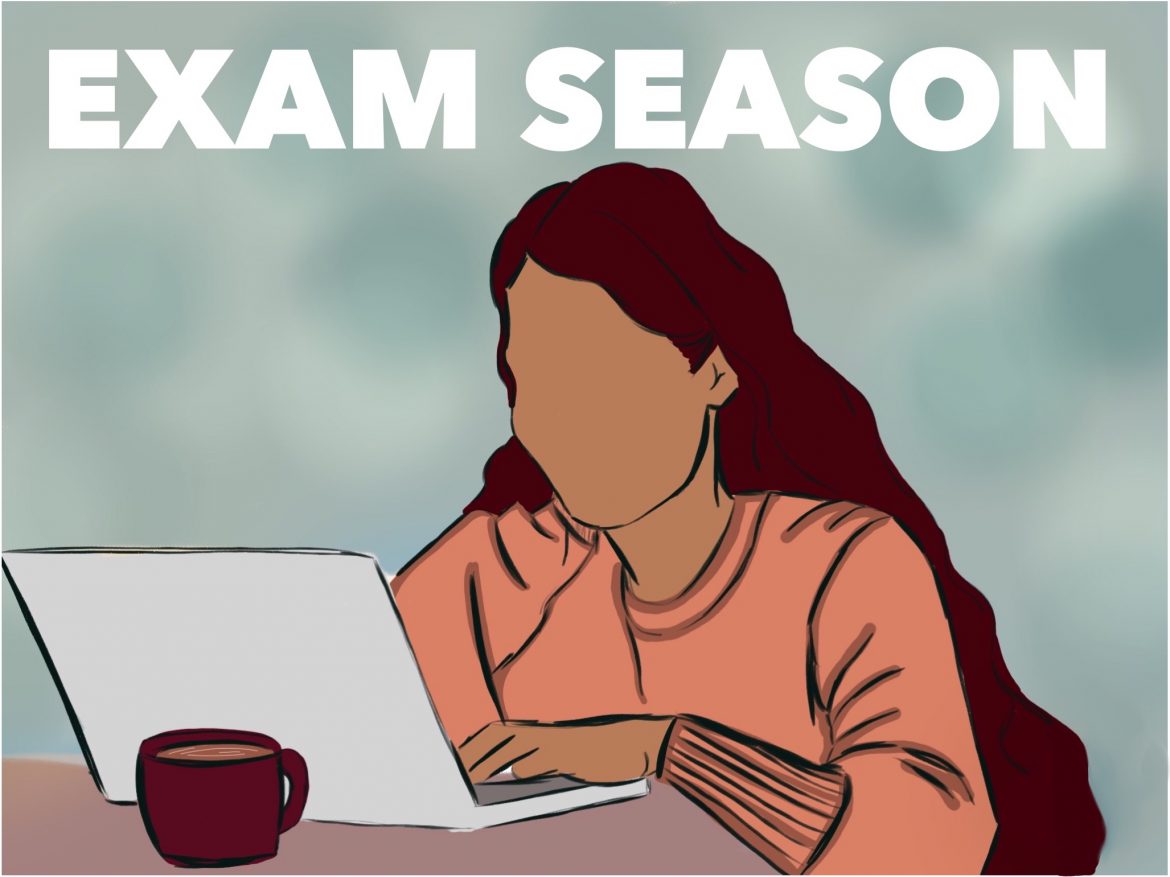Photo Credit: Angelin Thipahar, Illustration Editor
A pragmatic approach to studying and staying stress-free
Benjamin Lehner, Logos Editor
This upcoming exam season will perhaps be more difficult for students than those of prior years. As the weather continues to improve, and COVID-19 restrictions that have been in place for two years are lifted, it is only natural that many of us gravitate towards enjoying this new freedom with friends as opposed to staying locked away in our rooms studying for our finals. It goes without saying, but studying for exams is not fun. For many, it is stressful, overwhelming, and difficult to focus, and on top of this, final exam grades do not always accurately reflect the high degree of effort one puts into exam preparation.
I think all of us at one point or another have ventured online in search of videos demonstrating a proper study routine we wish to emulate in our own lives, yet they all seem too good to be true. Oftentimes the individuals in these videos are already completely organized, appear stress-free, and seem to have more hours in one day than any of us do in one week. That is why throughout this article, I will share some ways I have learned to study efficiently, effectively, and with minimal stress throughout my four years at U of T, while not ignoring the challenges of this task that students face, and I am hoping these tips will help you successfully navigate the fast approaching exam season.
One of the most important things a student can do to prepare for exam season is to get fully organized ahead of time. The school year can be quite chaotic, and it is easy for us to neglect things such as note-taking due to the greater priority we give midterms and projects. With that being said, it is imperative that when the school year dies down, and exam season is about to begin, students look back to make sure (at least some) notes have been created for every lecture and reading, as it is very difficult to do well on an exam when course material is missing from the content being reviewed during preparation. After compiling notes, I believe a great next step is taking a look at the exam schedule, and creating a study plan which revolves around it. This may seem obvious, but I can’t stress enough how important this is. By taking the time to do this, one is able to strategically determine both the days and number of hours one will spend studying for each examination. If these considerations are not made, one may be left without adequate time to review material for certain classes, and stress, cramming, and fatigue will ensue.
Even with a well-managed workload, stress and exhaustion do not disappear. Luckily, there are a number of actions one can take in order to make this happen, even temporarily. One of the most effective means of decompression is spending time with friends. It is worth sacrificing a few hours each week during the exam period to do this, and while it is easy to feel guilty for not spending this time studying instead, having great experiences with your friends, regardless of what you do, will lift your spirits immensely, and will allow you to feel more refreshed when you return to studying. Furthermore, you are showing your friends their importance in your life, and by taking the time and energy to arrange a gathering with them during a busy exam season, you demonstrate to them that their company is worth the sacrifice.
Apart from spending time with friends, there are a number of other activities that aid with recharging your mental battery that do not require other people, my favourite being long walks. We often marvel at the beauty of locations around the world, but I believe many of us fail to realize we have beauty right in our own backyards. Whether you live in downtown Toronto or in the Greater Toronto Area, I am certain you will be able to find forests, rivers or hiking trails if you look, and I encourage you to explore them further. Personally speaking, I have found that taking a walk to my local duck pond and sitting by the water in peace and quiet helps me clear my head and de-stress, and my own experiences lead me to believe that everyone should take advantage of these effects of nature.
Something which should be avoided at all costs is overworking. Regardless of if one just began studying for an exam the night before or has been doing so for weeks, one must be careful not to push the human body past its limits. I have come to understand that this will only do more harm than good, and while it may appear wise to study an absurd number of hours, take few breaks, and sacrifice sleep, performance on test day will be hindered due to this behavior. It may sound cliché, but if you are kind to your brain by taking part in these de-stressing activities then your brain will be kind to you, and it is easy to forget this due to the perfectly valid fear of not retaining enough information on test day.
One problem that can emerge during exam season, which can be more difficult to deal with compared to stress or exhaustion, is a lack of motivation to study. While planning a reward for oneself that can be enjoyed once exams are finished may be a great motivator for some, for others it may not be enough, and this is understandable. During exam season, one is already exhausted from course work completed during the school year, and the feeling of being close to the finish line coupled with the fact that exams do not produce immediate, recognizable effects on completion can lead one to believe they do not really matter. Remembering the importance of exams for career and graduate program prospects is one way in which I believe motivation can be heightened, but even if these and other thoughts do not encourage one to keep pushing forward, giving up is not an option, and one must remain resilient if success is to be seen.
While exam season is long, stressful, and overwhelming, there are steps we can all take to make this period more bearable, but this will not happen by itself—we need to put the effort in. We need to understand the importance of staying organized, not overworking ourselves, and reducing our level of stress and then do something about it, and meaningful results will follow. Many of these strategies do not require much other than our will to carry them out. For example, we do not need money to spend time with friends or enjoy the beauty of the natural landscapes around us, yet despite these low costs, the benefits are invaluable. Furthermore, not every student is the same, as each differs when it comes to workload, program and responsibilities outside of school. The advice I have provided in this article may not work for everyone, and this makes sense. I have simply described the ways in which I have been able to successfully stay organized and stress-free during exam season dating back to even before my time in university. I have been able to find what works for me by carefully reflecting after each exam I write in order to determine what went right and what went wrong, something which I encourage everyone to do.
So if you’re someone who has a difficult time dealing with the effects of exam season, don’t be afraid to try out some of the tips mentioned throughout this article. You may just find something new to add to your study routine to make it that much more tolerable, and I am confident that anybody who is willing to explore new methods of dealing with the weight of exams will eventually find those that help them study smarter, harder, and receive a better grade on exam day.




